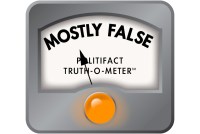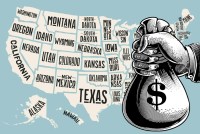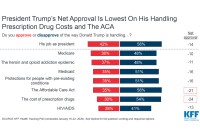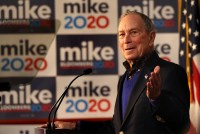Latest Morning Briefing Stories
Trump’s Medicaid Chief Labels Medicaid ‘Mediocre.’ Is It?
This claim ‘wouldn’t pass muster’ in a first-year statistics class.
KHN’s ‘What The Health?’: The Labor Pains Of ‘Medicare For All’
Organized labor is divided over whether to support “Medicare for All.” Meanwhile, many of the Democratic presidential candidates seem unable to use the health issue to their advantage. Rebecca Adams of CQ Roll Call, Jennifer Haberkorn of the Los Angeles Times and Alice Miranda Ollstein of Politico join KHN’s Julie Rovner to discuss this and more. Also, for extra credit, the panelists offer their favorite health policy stories of the week they think you should read, too.
Must-Reads Of The Week From Brianna Labuskes
Newsletter editor Brianna Labuskes wades through hundreds of health care policy stories each week, so you don’t have to.
KHN’s ‘What The Health?’: Live from D.C. With Rep. Donna Shalala
President Donald Trump’s proposed budget includes billions of dollars in health spending cuts, Congress gets back to work on surprise medical bills, and health care remains a top issue for the 2020 Democratic presidential candidates. Rep. Donna Shalala (D-Fla.), a former Health and Human Services secretary, joins the panel at a special taping before a live audience in Washington, D.C. Paige Winfield Cunningham of The Washington Post, Rebecca Adams of CQ Roll Call and Joanne Kenen of Politico join KHN’s Julie Rovner to discuss these issues and more.
No Quick Fix: Missouri Finds Managing Pain Without Opioids Isn’t Fast Or Easy
In the first nine months of an alternative pain management program in Missouri, only a small fraction of the state’s Medicaid recipients have accessed the chiropractic care, acupuncture, physical therapy and cognitive-behavioral therapy meant to combat the overprescription of opioids.
Must-Reads Of The Week From Brianna Labuskes
Happy Friday! In news that is technically really good and exciting but is also kind of icky: yarn made from human skin could eventually be used to stitch up surgical wounds as a way to cut down on detrimental reactions from patients. As CNN reports, “The researchers say their ‘human textile,’ which they developed from […]
Must-Reads Of The Week From Brianna Labuskes
Newsletter editor Brianna Labuskes wades through hundreds of health care policy stories each week, so you don’t have to.
5 Things To Know About Trump’s Medicaid Block Grant Plan
Federal officials unveiled guidance for states that want to opt out of some of the current funding program and instead seek a fixed payment to gain more flexibility.
KHN’s ‘What The Health?’: Remaking Medicaid — Maybe
The Trump administration is proposing to let states have more control of their Medicaid programs in exchange for potentially less money from the federal government. Meanwhile, the dangerous respiratory virus spreading from China is starting to affect trade and transportation along with public health. Kimberly Leonard of the Washington Examiner, Erin Mershon of Stat and Joanne Kenen of Politico join KHN’s Julie Rovner to discuss this and more.
Trump’s Latest Health Care Challenge: Gaining Voters’ Trust
The president, who has repeatedly pledged to improve health care and lower prescription drug prices, faces disapproval from a majority of Americans on his policies regarding drug costs, protecting people with preexisting conditions and the Affordable Care Act.
Call For FDA To Withdraw Preterm Birth Drug Divides Doctors and Insurers
A study ordered by the Food and Drug Administration failed to prove that Makena, the only drug approved to prevent premature birth, is effective. While a panel of experts has recommended withdrawing the drug’s approval, many doctors are wary.
Must-Reads Of The Week From Brianna Labuskes
Newsletter editor Brianna Labuskes wades through hundreds of health care policy stories each week, so you don’t have to.
Bloomberg y atención médica: traducir su historial como alcalde a nivel nacional
¿Qué puede decirnos el récord de Michael Bloomberg durante su período como alcalde de Nueva York sobre cómo podría abordar la atención médica desde la Casa Blanca?
Bloomberg On Health Care: Translating His Mayoral Record To The National Stage
Former New York City Mayor Michael Bloomberg uses health care as a key message in his Democratic presidential primary run. Now that he will be taking the stage in the Feb. 19 debate, the message could take on even more prominence.
En 2020, California planea a lo grande en atención médica
Los proyectos de ley de atención médica y las iniciativas presupuestarias de los políticos están llenas de ideas y dólares, y se oponen a industrias poderosas.
For 2020, California Goes Big On Health Care
California lawmakers are proposing ambitious health care ideas, from creating a state generic drug label to banning the sale of flavored e-cigarette products. Even though Democrats control state government, they’re likely to face pushback from powerful health care industry groups like hospitals.
KHN’s ‘What The Health?’: Trump Takes Credit Where It Isn’t Due
President Donald Trump says he “saved” popular protections for preexisting conditions, even though his administration is in court asking them to be struck down. Meanwhile, Democrats who want to run against Trump in the fall continue to argue among themselves over health issues. And Kansas may become the next state to expand Medicaid. Alice Miranda Ollstein of Politico, Tami Luhby of CNN and Shefali Luthra of Kaiser Health News join KHN’s Julie Rovner to discuss this and more.
Must-Reads Of The Week From Brianna Labuskes
Newsletter editor Brianna Labuskes wades through hundreds of health care policy stories each week, so you don’t have to.
KHN’s ‘What The Health?’: Democrats Roll Dice On SCOTUS And The ACA
A group of Democratic state attorneys general are betting the Supreme Court will take up the case and overturn a federal appeals court ruling in time for the 2020 elections. In other high-court news, most Republicans in Congress are asking the justices to use a Louisiana law to overturn the landmark abortion-rights ruling, Roe v. Wade. Joanne Kenen of Politico, Stephanie Armour of The Wall Street Journal and Paige Winfield Cunningham of The Washington Post join KHN’s Julie Rovner to discuss this and more. Rovner also interviews NPR’s Richard Harris, who wrote the latest KHN-NPR “Bill of the Month” feature.
One-On-One With Trump’s Medicare And Medicaid Chief: Seema Verma
Seema Verma, the administrator for the Centers for Medicare & Medicaid Services, sat down for a rare interview with KHN senior correspondent Sarah Varney. They discuss her views on President Donald Trump’s plan for sustaining public health insurance programs, how the administration would respond if Obamacare is struck down by the courts in the future and her thoughts on how the latest “Medicare for All” proposals would affect innovation and access to care.

















